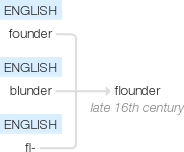Flounder
late 16th century: perhaps a blend of founder3 and blunder, or perhaps symbolic, fl- frequently beginning words connected with swift or sudden movement.
wiktionary
From Middle English flowndre, from Anglo-Norman floundre, from Old Northern French flondre, from Old Norse flyðra [1] [2], from Proto-Germanic *flunþrijǭ. Cognate with Danish flynder, German Flunder, Swedish flundra.
Possibly from the noun. Probably a blend of flounce + founder [3] or a blend of founder + blunder [4] or from Dutch flodderen(“wade”). See other terms beginning with fl, such as flutter, flitter, float, flap, flub, flip
etymonline
flounder (v.)
"struggle awkwardly and impotently," especially when hampered somehow, 1590s, of uncertain origin, perhaps from an alteration of founder (n.), influenced by Dutch flodderen "to flop about," or native verbs in fl- expressing clumsy motion. Figurative use is from 1680s. Related: Floundered; floundering. As a noun, "act of struggling," by 1867.
flounder (n.)
"flatfish," c. 1300, from Anglo-French floundre, Old North French flondre, from Old Norse flydhra, from Proto-Germanic *flunthrjo (source also of Middle Low German vlundere, Danish flynder, Old Swedish flundra "flatfish"), suffixed and nasalized form of PIE root *plat- "to spread."
